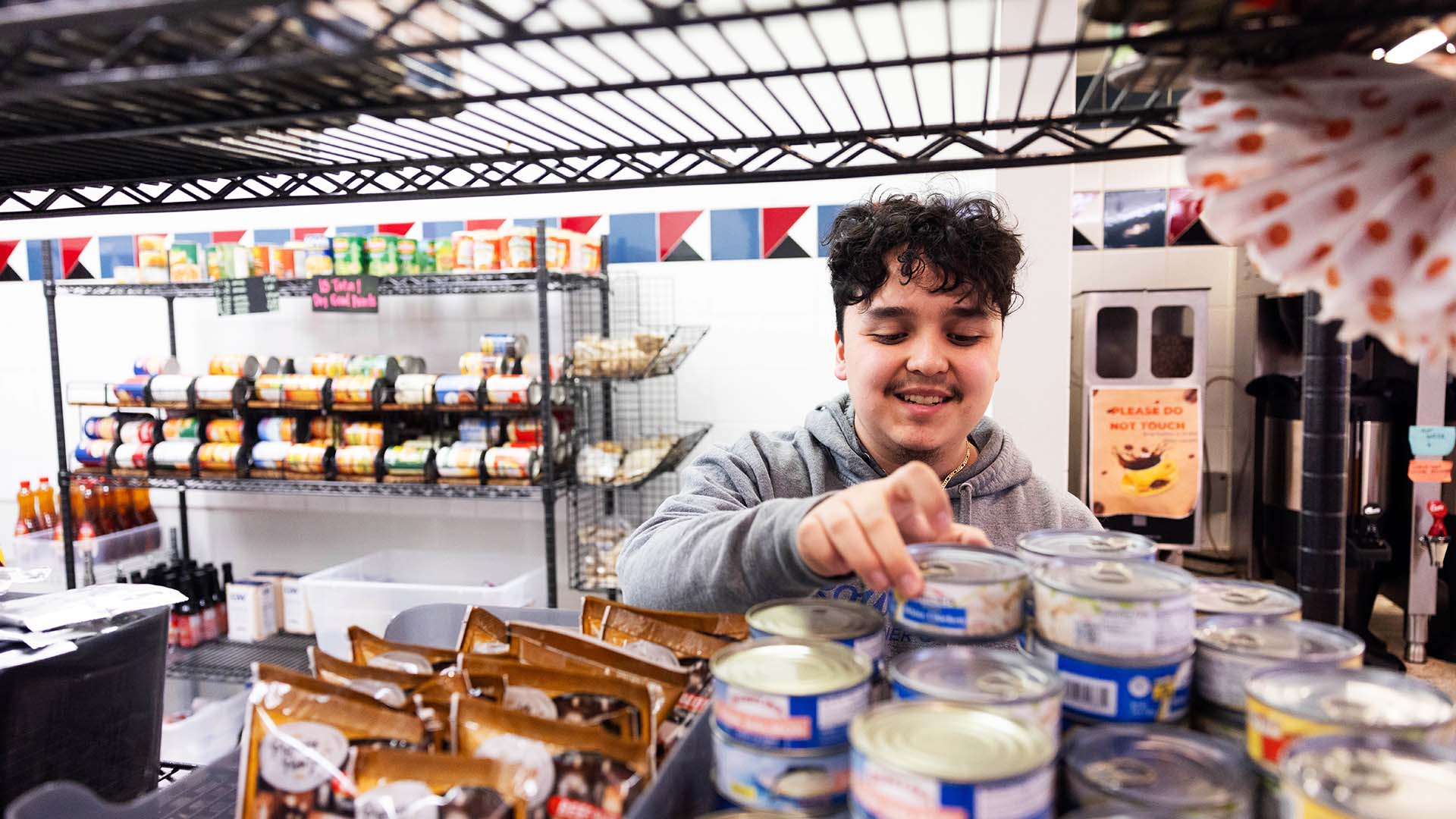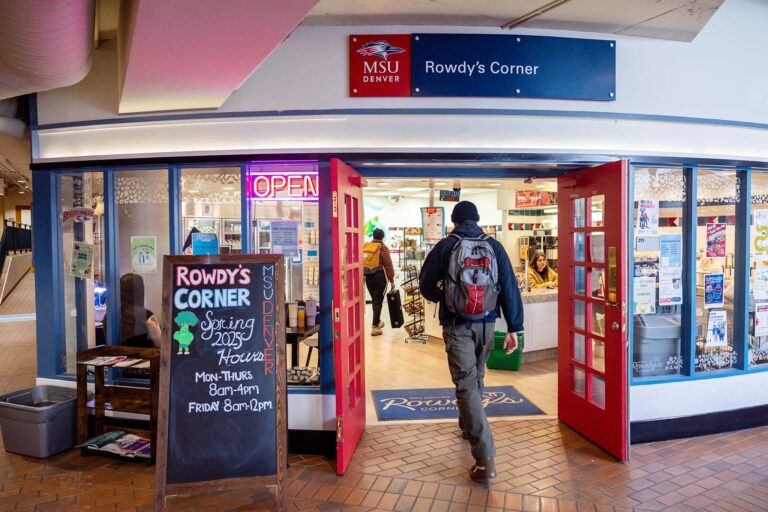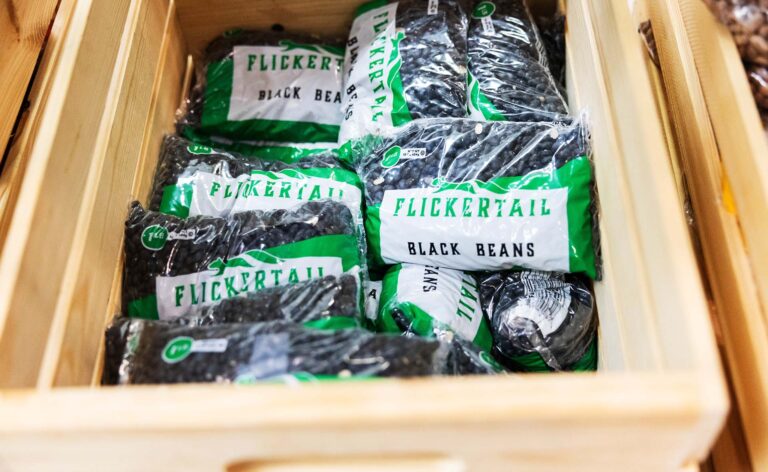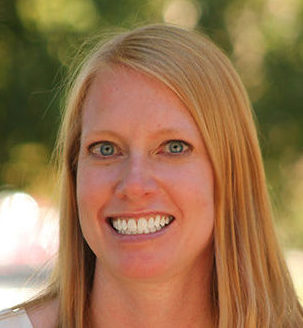Rowdy’s Corner helps feed the need for nutritious food
As food insecurity grows on college campuses, MSU Denver takes a holistic approach to get more students the meals and services they need to succeed.

This story appears in the Spring 2025 issue of RED Magazine.
Late on a Thursday afternoon, Alejandro Ramirez shows off the menu at Rowdy’s Corner, Metropolitan State University of Denver’s take on a corner grocery store. The laminated food list, in bright blue and red with a jaunty typeface, evokes an old-time diner menu.
But rather than prices next to items such as milk, soup and produce, the costs on the Rowdy’s Corner menu are expressed in points, says Ramirez, a third-year Business student. Each week, every MSU Denver student receives points, whether or not they know it or need them. Those points act like cash at Rowdy’s Corner, buying food in the hope that no one at the University ever has to go without.
As Ramirez explains the system, three students line up behind him, plastic grocery-store-style baskets full of food, waiting to check out. “It’s quiet now, though,” Ramirez said. “The rush is usually around noon.”
That afternoon, the spring semester was not quite four days old. But Rowdy’s Corner had already recorded 1,475 transactions, Ramirez said. Visits to Rowdy’s Corner have steadily increased ever since it opened in the fall of 2022. And if the nearly 1,500 visits in the first four days of the semester are any indication, that growth is on track to continue.
According to the most recent National College Health Assessment, conducted last spring, nearly 60% of MSU Denver students reported struggling with food insecurity and 7% experienced periods when they had no place to live.
Students not getting enough to eat isn’t a problem at MSU Denver alone, and it’s not a problem just in Colorado.
Last June, the U.S. Government Accountability Office reported that 3.8 million college students nationwide faced food insecurity in 2020, which confirmed previous findings. The U.S. Department of Agriculture defines food insecurity as having limited or uncertain availability of nutritionally adequate and safe foods.
A 2017 study in the Annals of Anthropological Practice found that college students are more likely than the rest of the population to suffer food insecurity. In interviews with some of those students, researchers found that “Most food-insecure students were faced with issues of stigma and shame daily, which prevented them from seeking assistance.”
The researchers recommended that effective solutions should protect student confidentiality and strive to alleviate that pervasive stigma.

Rowdy’s is a shiny, inviting — and busy — symbol of MSU Denver’s trailblazing work to address the stigma that comes along with food insecurity. Transforming the campus food pantry to something that feels more like grocery shopping than getting a handout is a cornerstone of that work.
When Ramirez, now in his third year on the job, first started working at the MSU Denver food pantry, it was “basically in a closet,” he said.
Students “would be lined up down the hall,” he said, because only a handful could be allowed in at once.
Like Ramirez, Angelica Marley worked at that “closet” where students had to ask for items and staff members would collect them. “That takes courage, asking for things,” said Marley, who’s now the manager of Rowdy’s Corner and who graduated in May with a degree in Public Health. Checking out meant students had to share personal information to make sure they qualified for assistance.
Dennis C., a fourth-year student who asked that his last name not be used, is a veteran of that system.
On a cold January day, Dennis sat in Rowdy’s Corner munching on a bagel he had brought from home to toast and reflecting on how different this space is, with its stocked shelves and students picking up instant oatmeal, cans of soup or protein bars.
“There was a lot more embarrassment to be felt in that room,” Dennis said of the old food pantry.

There’s plenty of blame to go around for the cause of rising food insecurity. Food prices rose 2.5% in the course of 2024, according to the U.S. Bureau of Labor Statistics. And the average Denver apartment rented for $1,875 last year.
Not surprisingly, students responding to that health assessment also cited anxiety, depression and stress as primary factors affecting their academic performance.
|
More than a hill of beans Most people wouldn’t view ramen as a healthy meal option. But then, most people don’t have Katrina Suthers’ nutrition smarts and her natural creativity in the kitchen. “People are going to eat ramen,” said Suthers, who earned her master’s in Nutrition in 2022 and served an internship as resident dietician at Rowdy’s Corner last fall. It’s cheap, easy and accessible. So rather than bad-mouth the dried-noodle packets, she found a way to make them healthier. In a YouTube video, she whipped up peanut butter, a little oil and a lot of vegetables, and the result was a main dish as colorful and nutritious as it was affordable and easy to make. In addition to access to a registered dietician, Rowdy’s Corner customers have another advantage over many other college students. “Our population is a little older, they have been living on their own,” Suthers said. Having wrestled with the daily “What-are-we-having-for-dinner” dilemma, they appreciated her suggestions and weren’t as scared of Rowdy’s Corner’s fresh fruits and vegetables. “They were like, ‘yeah, I know what to do with this bag of beans.”
|
|
“If we want students to succeed and graduate and thrive, meeting their basic needs is a priority,” said Richard Miccio, associate director of Well-being, Inclusion and Behavioral Intervention at the Health Center at Auraria. “I think one of the most important things is how MSU Denver has changed its approach to dealing with student food insecurity.”
In addition to relocating where students get food from a tiny, out-of-the-way room to the spacious corner store that is Rowdy’s Corner, MSU Denver has transferred responsibility for addressing food insecurity to the University’s new Health & Well-being team.
RELATED: As food insecurity on campus grows, students are Cooking with Purpose
That shift paved the way for MSU Denver to implement what Miccio calls a holistic approach to dealing with student food insecurity. “The Health Center is a hub for health and well-being,” he said, “so we can identify some of those needs and connect students to services.”
That can include getting qualifying students signed up for food benefits, known as SNAP, and the popular, free Cooking With Purpose classes. Those classes draw students who want to learn cooking techniques, said Margarita Driscoll, program administrator at the Health Center, as well as those who just need a nutritious meal.
Miccio suspects that the increase in Rowdy’s Corner visitors reflects more than growth in just food insecurity. “Need has grown, but the willingness of students to seek services also has increased,” he said.
Which must be a sign that in its new holistic approach to the problem of food insecurity, MSU Denver is on the right track.







